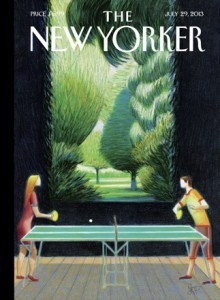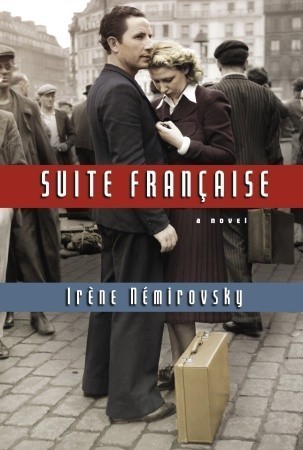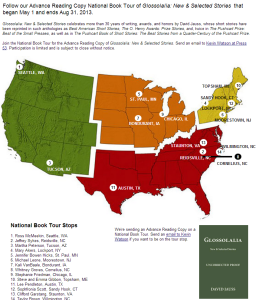Clifford Garstang's Blog, page 75
July 23, 2013
Sewanee Writers Conference 2013
 It’s that time again–time for the Sewanee Writers Conference.
It’s that time again–time for the Sewanee Writers Conference.
The conference begins tonight, Tuesday, July 23, and runs through Saturday, August 3. When this post appears online, I should be on the road, heading from Virginia to Tennessee. I can’t wait to get back to “the mountain”!
This will be my fifth time at Sewanee. I can’t help myself–it’s both great fun and a wonderful, stimulating learning experience. The first four times, though, I went for the fiction workshops. This time, I’m doing playwriting–a new experience for me. (I hope to have time to sit in on one of the fiction workshops, however, as that is still my primary interest.)
When I first went to Sewanee, I was still pretty new to writing. I’d finished my MFA, but hadn’t published much yet. I requested to work with Richard Bausch that year, and we had a wonderful workshop (with Jill McCorkle as the co-leader). For my workshop material I used the opening of the novel that had been my MFA thesis. Dick had some good suggestions, but that project is still stuck in a drawer. I’d like to return to it one of these days.
I went back two years later as a “scholar”–which means I’d published a number of stories by then and got some financial assistance to attend–and was in John Casey’s workshop (co-led by Claire Messud). Again, that was a wonderful experience, and stories I workshopped that year ended up in my first collection, although it was a few more years before that book came out.
Two more years later and I went back to work with Tim O’Brien (with Erin McGraw as the co-leader of the workshop). Working with Tim was sensational, and he was extraordinarily generous with his time. Stories he helped me with landed in my second book.
The last time I went, in 2010, was just after my first book came out, and I was honored to be awarded a fellowship. That year I worked with Padgett Powell (in a workshop co-led by the wonderful Christine Schutt). Padgett (or Colonel Powell, as he preferred to be called) helped with the novel I’m still working on–but hope to finish this fall.
And now it’s three years later. I wanted to go back, but it felt awkward to go back in fiction, and I’ve always wanted to try my hand at playwriting, so that’s what I’m doing. I’ll be working with Dan O’Brien and Daisy Foote. It’s going to be great, and since I know I don’t know what I’m doing in this genre, I should have a pretty open mind when it comes to criticism.
Can’t wait to see everyone Tuesday night!
July 22, 2013
The New Yorker: “Collectors” by Daniel Alarcón
 July 29, 2013: “Collectors” by Daniel Alarcón.
July 29, 2013: “Collectors” by Daniel Alarcón.
We learn from the Q&A with Daniel Alarcón that this “story” is excerpted from his forthcoming novel. I guessed as much, given the rushed ending. But I liked the piece anyway. Interestingly, the work is related to Alarcón’s earlier story in The New Yorker (in 2008), “The Idiot President,” which I discussed here. That story, apparently, was part of a novel that the author later scrapped. However, the character of Henry, and his play “The idiot President,” was resurrected for the new novel. It’s interesting to read how writers like Alarcón approach their problem novels and how they can sometimes recycle their ideas in this way.
In any case, this “story” is about two men, Henry and Rogelio, who find themselves cellmates in prison for very different reasons. Henry is a playwright charged with terrorism for his play, “The Idiot President,” and Rogelio is guilty of drug trafficking. But beyond proximity, they have nothing in common . . . and yet, they become lovers.
The story is based on an actually prison in Lima, Peru (although the events, Alarcón stresses, are fiction). I liked his novel, Lost City Radio, and I’m intrigued by this excerpt, so I hope to read this new novel. But given that it’s an excerpt, I’m not sure there’s much scope for interpretation. Conditions in the fictional prison are very bad; life in prison is hard and creates strange bedfellows; political repression sucks. Is there more to it than that?
Split This Rock Poetry Festival: Poems of Provocation & Witness
Split This Rock Announces Poets for 2014 Split This Rock Poetry Festival
Diverse line-up of prominent citizen-poets to take to DC stages March 27-30, 2014
Split This Rock is pleased to announce the 16 poets who will feature at the fourth national biennial Split This Rock Poetry Festival: Poems of Provocation & Witness in Washington, DC, March 27-30, 2014. Among the most significant and artistically vibrant writing and performing today, they also exhibit exemplary public citizenship as activists, teachers, and supporters of marginalized voices.
The poets to be featured are Sheila Black, Franny Choi, Eduardo C. Corral, Gayle Danley, Natalie Diaz, Joy Harjo, Maria Melendez Kelson, Yusef Komunyakaa, Dunya Mikhail, Shailja Patel, Wang Ping, Claudia Rankine, Tim Seibles, Myra Sklarew, Danez Smith, and Anne Waldman. They represent the great diversity of poets writing and performing in the United States today: poets writing in all poetic styles, men and women of many races, ethnicities, sexual orientations, ages, and social classes.
“We are thrilled to bring these exemplary poets from all over the country to DC’s stages,” says Executive Director Sarah Browning. “Poetry can tell hard truths, can challenge and succor us. These poets are visionaries, helping imagine a future based on principles of justice, one that honors the transformative power of the imagination.”
Split This Rock Poetry Festival is DC’s premiere poetry event and the only festival of its kind the country, highlighting poets working at the intersection of the imagination and social change. The festival features readings, workshops, panel discussions, youth programming, activism—opportunities to speak out for justice, build connection and community, and celebrate the many ways poetry can act as an agent for social change. Registration will open in the fall of 2013.
Split This Rock 2014 Featured Poets
Full biographies and photographs can be found at www.SplitThisRock.org
Sheila Black is the author of House of Bone, Love/Iraq, and Wen Kroy and co-editor of Beauty is a Verb: The New Poetry of Disability. A 2012 Witter Bynner Fellow, she lives in San Antonio, TX, where she directs the literary arts center Gemini Ink.
Franny Choi has been a finalist at the National Poetry Slam, the Individual World Poetry Slam, and the Women of the World Poetry Slam. She co-coordinates ProvSlam Youth, a program for young writers in Providence, RI.
Eduardo C. Corral’s first book, Slow Lightning, won the 2011 Yale Series of Younger Poets competition. The recipient of a Whiting Writers’ Award and a National Endowment for the Arts Fellowship, he currently lives in New York City.
Gayle Danley won the 1994 National Individual Slam Competition. She maintains a constant tour of elementary and secondary schools, helping students with traumatic experiences and teaching workshops on Slam poetry to all age groups. She lives in Baltimore, MD.
Natalie Diaz’s first book, When My Brother Was an Aztec, was published in 2012 to much acclaim. She lives in Mohave Valley, AZ, and directs a language revitalization program at Fort Mojave, her home reservation, working with the last Elder speakers of the Mojave language.
Joy Harjo is an internationally known poet, performer, writer, and saxophone player of the Mvskoke/Creek Nation. Her most recent books are a memoir, Crazy Brave, and a collection of conversations, Soul Talk, Song Language. She writes a column, “Comings and Goings,” for her tribal newspaper, the Muscogee Nation News and lives in Glenpool, OK.
Maria Melendez Kelson has published three poetry titles, most recently Flexible Bones. She lives in Pueblo, CO, where she teaches at Pueblo Community College. Her nonfiction appears in Ms. Magazine, and Sojourns, among other venues.
Yusef Komunyakaa’s seventeen books of poetry include Taboo, Dien Cai Dau, Neon Vernacular, for which he received the Pulitzer Prize. His plays, performance art, and libretti have been performed internationally and his prose is collected in Blues Notes: Essays, Interviews & Commentaries. He teaches at New York University.
Dunya Mikhail is an Iraqi-American poet who left Iraq in the 1990s when her work as a journalist for The Baghdad Observer was found “subversive.” Her first book in English, The War Works Hard, was shortlisted for the Griffin Prize and Diary of A Wave Outside the Sea won the 2010 Arab American Book Award. A new book of poetry, The Iraqi Nights, is forthcoming in 2014. She lives in Michigan.
CNN calls Shailja Patel “the people-centered face of globalization.” An internationally acclaimed Kenyan poet, playwright, public intellectual and activist, her performances have received standing ovations on four continents. Her first book, Migritude, was an Amazon poetry bestseller and a Seattle Times Bestseller. She divides her time between Kenya and Berkeley, CA.
Wang Ping was born in Shanghai and came to USA in 1986. She is the founder and director of the Kinship of Rivers project, which builds a sense of kinship among the people who live along the Mississippi and Yangtze Rivers. Publications include short story collections, novels, and the poetry collections Of Flesh and Spirit and The Magic Whip. She teaches at Macalester College in St. Paul, MN.
Claudia Rankine is the author of four collections of poetry, most recently, Don’t Let Me Be Lonely, a multi-genre project that blends poetry, essays, and image. She is also the author of a play, Provenance of Beauty: A South Bronx Travelogue, which is performed on a bus ride through the Bronx. She lives in southern CA, where she teaches at Pomona College.
Tim Seibles is the author of several poetry collections, most recently Fast Animal, a finalist for the 2012 National Book Award. A National Endowment for the Arts fellow, Seibles teaches at Old Dominion University and in the Stonecoast Writing Program at the University of Southern Maine. He lives in Norfolk, VA.
Myra Sklarew’s numerous collections of poetry include Lithuania: New & Selected Poems and Harmless.Forthcoming is A Survivor Named Trauma: Holocaust and the Construction of Memory. She was the founding director of the MFA Program in Creative Writing at American University and is professor emerita of literature. Past president of the Yaddo artist community, Sklarew is a key organizer of “A Splendid Wake,” a documentation project of poets and poetry activities in DC from 1900 to the present.
Danez Smith works as a Student Advisor for the First Wave Hip-Hop & Urban Arts Learning Community at the University of Wisconsin-Madison. He has performed across the country in schools, community centers, poetry venues, and theatres, as well as to the UK, Mexico, Switzerland, and Panama. He is an assistant editor for Muzzle Magazine and edits the Line Breaks Chapbook Series for First Wave.
The author of more than 40 collections of poetry and poetics, Anne Waldman is an active member of the Outrider experimental poetry movement. A recipient of a 2013 Guggenheim Fellowship and the Poetry Society of America’s Shelley Memorial Award, she has recently been appointed a Chancellor of The Academy of American Poets. Waldman co-founded with Allen Ginsberg the Jack Kerouac School of Disembodied Poetics at Naropa University, where she is a Distinguished Professor of Poetics.
Full biographical information and photographs can be found at www.SplitThisRock.org.
July 21, 2013
The Book Tour–updated
 It used to be that publishers would send their authors on national book tours to promote new releases. That still happens with a few titles, and most authors still travel a bit to help their books find an audience–even if they have to pay their own way and sleep on the couches of their friends.
It used to be that publishers would send their authors on national book tours to promote new releases. That still happens with a few titles, and most authors still travel a bit to help their books find an audience–even if they have to pay their own way and sleep on the couches of their friends.
In recent years, the “virtual book tour” has become popular. In the VBT, the author or publisher sends copies of the book to bloggers and may arrange for interviews or guest-blog appearances on specific dates. I did one of those and I appeared on nearly 20 blogs during the month just after the release of my last book.
But Press 53 is doing something I’ve never heard of to support David Jauss’s new book, Glossolalia. A small press like Press 53 can’t send Jauss all over the country, but it can arrange for the book to travel. I was a little confused about this until I agreed to participate. And then a few days ago, the book arrived in the mail–not from Press 53 or Jauss–but from the previous host. The book includes instructions. I am to read the book, sign and date the back page along with the previous host/readers, and mail it to the next person on the list. The copy I’ve just finished reading has been to Texas, New York, Maine, North Carolina, Iowa, and Minnesota, and from here (Virginia) it’s headed to Connecticut.
(The instructions also recommend taking a picture of the book being read in a public place, hence the picture above. I took it to my bookclub meeting this week.)
Check out the progress of the tour here.
2013 Reading: Glossolalia by David Jauss
By David Jauss
Press 53 (September, 2013)
I first became aware of David Jauss from reading his wonderful essays on the craft of fiction that appear often in The Writer’s Chronicle, the magazine of the Association of Writers and Writing Programs. Invariably, these essays are lucid and helpful. I was very pleased, then, to learn that Press 53, the publisher of my two short fiction collections, planned to publish Jauss’s new book, Glossolalia, and I was even more pleased when I was offered the chance to see an Advance Reading Copy. Having just finished reading the book, I feel honored that we share a publisher.
The book includes stories that have won Pushcart Prizes and O. Henry Awards and have appeared in Best American Short Stories. Some of the stories have been published in prestigious literary magazines such as StoryQuarterly, Shenandoah, New England Review, and Prairie Schooner. And all of the stories are rewarding to read.
My favorite story in the book is the title story, “Glossolalia,” which originally appeared in Shenandoah and also was reprinted in Best American Short Stories and the Pushcart Prize anthology. It’s a dark tale about a father who is struggling to take care of his family and the son who can’t quite bring himself to forgive him for his failures. The title refers to the religious act of speaking in tongues but also to the fact that this father tries to explain himself to his son in words that the son can’t, or won’t, understand. It’s a very powerful story.
But there are others that leave just as strong an impression. Another favorite is “Rainier,” also about a father who needs forgiveness from his son. I also loved “Tell Me Something,” a story about a couple who have been married for a very long time but are still learning about each other. In many of the stories, an outcast is looking for a way to fit in or, at any rate, to make his own way in the world. “Misery” (described as “after Chekhov”) is about a hunchback who has been humiliated by his colleagues. “The Bigs” is about a baseball player from the Dominican Republic who is out of place in multiple ways. In “Hook,” a man invents an explanation for his prosthetic hand. Not to mention the story “Shards,” which is about a man who—no, I’m not going to say what that one’s about except to say that it’s a pretty disturbing story.
The book begins with another very powerful story in this same vein. In “Torque,” a man has lost his family because of his obsession with owning a limousine. He buys an old Cadillac and plans to fix it up, but his wife gets fed up with him and his dream and leaves. Because he wants to turn it into a stretch limo, he cuts the car in half, an act that attracts the attention of a neighbor in a way that surprises the reader.
Glossolalia is a powerful collection of moving stories, unlike anything else I’ve read recently. You still have time to pre-order a signed copy.
July 20, 2013
Prime Number Magazine — Issue 41
 The other editors of Prime Number Magazine and I put in a lot of work to produce our journal. We’ve been doing it for three full years now, which just seems amazing to me. Where has the time gone!
The other editors of Prime Number Magazine and I put in a lot of work to produce our journal. We’ve been doing it for three full years now, which just seems amazing to me. Where has the time gone!
And now we’ve just launched the latest issue, Number 41, to start our 4th year. There’s a lot to like about this issue. Our poetry editor, Val Nieman, has selected some wonderful poems–work by Rick Marlatt, Alexa Mergen, Robert Okagi, and Barbara Presnell. Our new nonfiction editor, Jon Chopan, brings us essays by Lee Gulyas, Brock Kingsley, and Elaine Neil Orr. Brandon Shuler, who joined us last issue as the books editor, gathered reviews of books by Jen Michalski, Pam Houston, and Patricia Hughes as well as an interview with Ramona Ausubel. In addition to my duties as editor in chief, I also edit the fiction, and I was delighted to select four stories for the issue, by Catherine Uroff, Monic Ductan, Angele Ellis, and Matthew Neill Null.
So I hope you’ll check it out. And if you’re a writer, we’d love it if you would submit your work to us for possible publication. Submission is easy–we use the Submittable online submission manager. To read about our submission guidelines, go here: Submit.
July 19, 2013
Blue Ridge Anthology 2013
Published by Cedar Creek Publishing for the Blue Ridge Writers Chapter of the Virginia Writers Club, the Blue Ridge Anthology 2013 is an impressive collection of writing in poetry and prose. I had the honor of being invited to provide a story for the anthology, so it includes “In the Palace of Cortes,” a piece I did a few years ago after a visit to Cuernavaca, Mexico. (Not the Blue Ridge, but it does take place in a mountainous region.)
Earlier this week, my writers group, SWAG Writers, hosted a reading at the Shenandoah Valley Art Center to promote the anthology. Six contributors read–three of us reading from the book, three others reading other work–to an audience of more than 20 in the main gallery at SVAC. (The gallery was hung with the colorful work of artist Joe Garber, which made a beautiful backdrop for the event.)
It was a very nice event and we hope to continue our relationship with SVAC for future readings.

July 18, 2013
Breaking News . . .
 Well, not breaking, exactly, but I was on the news last night. My group, SWAG Writers, held a reading last night at the Shenandoah Valley Art Center to promote the Blue Ridge Anthology 2013. We sent out press releases and Channel 29 got wind of it. They showed up with a camera and here is the result:
Well, not breaking, exactly, but I was on the news last night. My group, SWAG Writers, held a reading last night at the Shenandoah Valley Art Center to promote the Blue Ridge Anthology 2013. We sent out press releases and Channel 29 got wind of it. They showed up with a camera and here is the result:
Writers Group Hosts Reading of Blue Ridge Anthology Contributors
July 15, 2013
The New Yorker: “From a Farther Room” by David Gilbert
 July 22, 2013: “From a Farther Room” by David Gilbert
July 22, 2013: “From a Farther Room” by David Gilbert
What, then, is this creature Robert finds?
Robert, while his family is away, is out on the town with his unmarried friend—they eat and drink too much, but instead of going on to a strip club, Robert heads home after a nightcap during which the friend unburdens himself about his father’s dire medical condition. Robert, it will be revealed, didn’t have such a great relationship with his own father, and is somewhat uncomfortable with his sons. His wife and kids (two boys and a girl) are currently visiting the wife’s wealthy parents, leaving Robert alone with the dog to fend for himself. He wakes up, hungover, to discover a creature of some kind on the floor, perhaps the product of his nocturnal vomiting. At first his instinct is to get rid of it, but he can’t. As a kid, he was into rescuing wounded birds, at least until the time his father chastised him for wasting his time and killed a bird. One of the story’s great strengths is the acceptance of this thing as real—a surreal situation becomes natural.
During the course of the day caring for the creature, Robert becomes attached, and calls it “You,” because he is speaking directly to it. When the wife returns, the reader is wondering what has become of “You,” but Robert has the thing safely stashed away in the basement. Cheever meets Kafka, as Gilbert suggests in the Q&A with David Gilbert.
So, what is this thing? At one point, it is called a nightmare. But it doesn’t seem as simple as that. It’s a memory, isn’t it? Or a memory of something that didn’t happen? It evokes not only his strained relationship with his father, but his own discomfort with his fatherhood. He addresses the thing as “You,” but it’s really a part of him, isn’t it? (Which is how many second person stories proceed, after all.) And is it a part of him that he’s going to leave in the basement? Or will he be able to call it forth from time to time, and become the father he himself needed?
Gilbert had another story in the New Yorker at the end of last year (see this discussion of “Member/Guest”) but I find this one far more interesting.
One last thing: is the title an allusion that I’m missing? I hope someone will enlighten me. In any case, it does seem to refer to the recesses of Robert’s memory, and of course the word “farther” couldn’t be much closer to “father,” which for me is what the story is all about.
July 14, 2013
2013 Reading: Suite Francaise by Irene Nemirovsky
 Suite Française by Irene Nemirovsky is brilliant. I bought the book in 2007 when everyone was reading it, but I didn’t get around to it. I knew the subject matter, and maybe I thought it was too dark. But recently my Reading Liberally group chose it to read, so I opened it up and dived in.
Suite Française by Irene Nemirovsky is brilliant. I bought the book in 2007 when everyone was reading it, but I didn’t get around to it. I knew the subject matter, and maybe I thought it was too dark. But recently my Reading Liberally group chose it to read, so I opened it up and dived in.
Wow. As you probably already know, Nemirovsky was respected novelist, a Russian emigre in France, when she was arrested in 1942 and died later that year in a concentration camp. Her husband was also arrested and killed, but her two daughters, protected by their governess and various family friends, managed to survive. And so did the manuscript of this book.
The book consists of two sections out of a planned five-part book that would have mirrored the structure of a symphony. The first section, “Storm in June,” details the great exodus from Paris in 1940 as the Germans approach. The narrative follows several different Parisian residents as they flee, their paths sometimes intersecting. I found this account enthralling. The second section, “Dolce,” is the story of the interaction between the residents of a village some distance from Paris and the German soldiers who make up the occupying force. Again, this is fascinating. The book also includes the author’s notes, giving some idea of where the remainder of the novel was headed. What a terrible loss that it was never completed.







